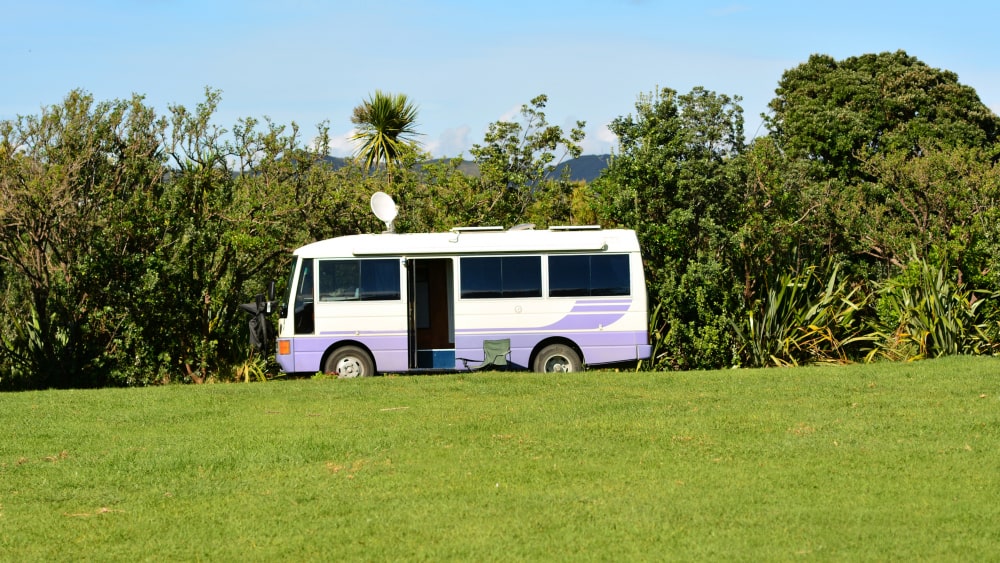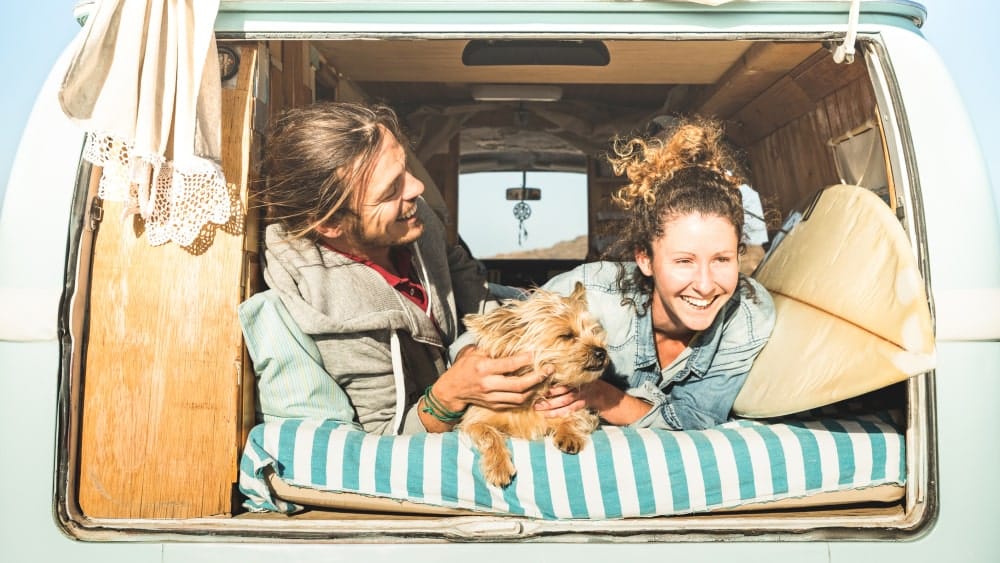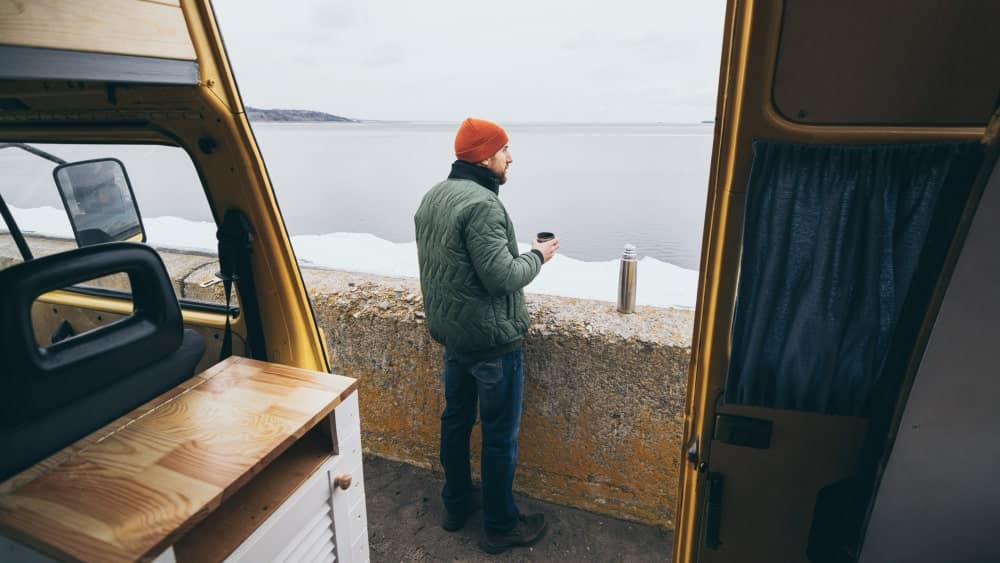The nomadic lifestyle isn’t a new fad or way of life; hunters and gathers of yesteryear never had a traditional address. But fast forward to the 1960s; that was when the Volkswagen van shot to stardom, courtesy of the hippie movement.
The idea of living on the road was attractive to that generation, but it seemed to die down — for a while. While scores of Americans find it blissful to own a traditional house, it’s estimated about one million individuals prefer to dwell in a home on wheels.
Social media may have had something to do with reigniting the wanderlust spirit. A decade ago, a millennial took to the road and sparked a nomadic movement with #vanlife, which has now been used more than six million times on Instagram.
Making Your Alternative Home Safe

While having the freedom to wake up to different scenery and experience new adventures is intriguing, road warriors should create an extensive and strategic plan to ensure everyone’s safety.
Roadside Assistance
Regardless of road and weather conditions, you will want plenty of options when something unexpected happens. Having a reliable 24-hour service, such as Good Sam Roadside Assistance, is vital for van dwellers. As you conduct your online research, confirm that the service you select is available in the states where you will wander. It’s important to note that an ordinary roadside service may not suffice, especially if your van needs to be towed.
Travel Safety Tips for Your Pooch

While dogs are our best friends, they can be distracting while driving. That’s why it’s highly recommended that Fido remains in a crate when the van is in motion. It can be potentially hazardous for your pet if you need to brake suddenly and especially if an airbag deploys. By keeping your furry friend comfortably restrained, they will be better protected. Some laws mandate it; law enforcement in Maine, Massachusetts, and Connecticut can even issue a ticket when a dog is in the passenger seat. If you decide to let your dog ride shotgun, turn off that airbag. A few more tips: Never leave your pet unattended and be sure Fido has an ID tag and is microchipped in case you become separated.
Stay Connected
Living off the grid may generate feelings of freedom, but in an emergency, you may need immediate assistance. On the flip side, someone may need to contact you. Check out the Best Satellite Messengers of 2022 when you plan to escape and connect with nature. A GPS emergency location beacon allows you to send your coordinates via a distress signal to local emergency services.
Off-Road Portable Air Compressor
Potholes, wayward nails, and other things that go bump in the night can bring your tires — and van — to a standstill. Being isolated in no-man’s land is not the time for buyer’s remorse. Having a high-performance air compressor when you are miles away from civilization is never a bad idea. View the 2022 Best Off Road Air Compressors buyer’s guide to find one that’s right for you. If you can safely inflate a flat tire, you won’t waste time waiting on roadside assistance.
Speaking of tires, if you plan to be on the road when they could be covered with ice or snow, be sure to keep a supply of rock salt and a set of tire chains with you. This will give you better traction when roads are slippery.
Flashlights, Flares, and Fire
Light up the night with high beam flashlights that can expose lost objects or illuminate your path. Check out this wide selection of versatile, powerful flashlights.
Investing in road flares will make you visible to passersby if you experience mechanical failure.
A stray spark from a cooktop stove or campfire can rapidly turn a quiet evening into a catastrophe. To prevent flames from spreading, keep several fire extinguishers on hand. Place one in the kitchen, one in the sleeping quarters, and one near the driver’s seat. The National Fire Protection Association has published helpful guidelines on testing and maintaining your fire extinguisher.
Smoke and Carbon Monoxide Detectors
Carbon monoxide poisoning is deadly serious and detectors can be lifesavers. Some units have dual functionalities and can sound alerts when they detect smoke and carbon monoxide. And keep those batteries fresh. As a rule of thumb, install new batteries when you change your clocks every spring and fall for daylight savings. Also, test all detectors frequently. If they sound an alarm occasionally, that’s your signal that they have reached the end of their lifespan. Those exposed to extreme cold for long durations may lose their ability to function and should be replaced.
Parking in Paradise
The goal of living in your van is to experience a sliver of paradise — including when it’s parked. You will want peace of mind when you are relaxing or sleeping in your parked van, without worrying that it may rock and roll. It only takes a few unstable rocks or a bit of shifting sand to tilt and shift your home on wheels. This unintentional motion can be more than a nuisance; it can cause physical damage to people and your property. Wheel chocks are ideal tools that stabilize your home when it’s parked in paradise.
Personal Safety

Be aware of your surroundings and avoid parking in isolated areas. Do you know how long it will take to reach a gas station or pharmacy? Do you have an alternate path in case one is blocked? Keep pepper spray with you when walking alone or anytime it’s dark, and ensure your van’s doors are locked — even during daylight hours.
Plan an Escape Route Before You Park
Think of the last time you drove your vehicle to a sporting event. With such a crowd, you felt joyous to find a spot. But when it was time to leave, you may have wished you had backed into that spot. This holds true when you park your van. Examine your exit routes. If the heavens burst open and send a flash flood, you may be in a hurry to move your van to higher ground. That won’t be the time to negotiate twists and turns on dangerous, muddy roads.
Monitor the Forecast
Living in your van will put you up close and personal with all the elements of nature. Not all storms send warnings that they are about to release their fury. Invest in a weather alert radio to learn if you are in a danger zone. And if it’s hurricane season, visit the NOAA website often.
Avoid tall trees that could be lightning rods. Remove awnings and collect all items outside that could become airborne.
Frosty and Frozen

If water pipes can freeze in traditional homes, you can be sure they can freeze in your dream home on wheels. Keeping external pipes wrapped with insulation may protect them in mercury-dipping weather. Also, have a plan of potential places to lodge overnight during the cold months, as many campsites are closed. Even those open to the public may not be accessible during a snowstorm. Finally, dress in layers and have plenty of blankets.
Other miscellaneous essentials that van dwellers should have on board include a first aid kit, shovel, gas can, and jumper cables.
When you choose the van life, you will inevitably encounter safety hazards. Refer to this checklist often so that you and your companions remain safe and secure, wherever you may roam — or roll.
